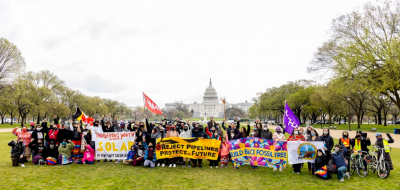U.S. Army Corps of Engineers Allows Dakota Access Pipeline to Continue Operation

All Global Research articles can be read in 51 languages by activating the “Translate Website” drop down menu on the top banner of our home page (Desktop version).
***
The U.S. Army Corps of Engineers (Corps) on Friday said they will allow the Dakota Access oil pipeline to continue to flow without a federal permit. The decision was revealed in a court filing in federal District Court the District of Columbia.
The Corps officially refrained from taking a position by saying they need more time, which will allow the pipeline to continue operating illegally, without a valid permit.
The decision comes despite strong pressure by Native Americans and environmental groups that had their hopes up the Biden administration would order the pipeline will be shut down. Last week a group of Native Americans youth marched throw the streets of Washington to outside the White House to send a strong message to President Biden to shut down the pipeline.
“We are gravely concerned about the continued operation of this pipeline, which poses an unacceptable risk to our sovereign nation,” Standing Rock Sioux Tribe Mike Faith said. “In a meeting with members of Biden’s staff earlier this year, we were told that this new administration wanted to ‘get this right.’ Unfortunately, this reported update from the U.S. Army Corps of Engineers shows it has chosen to ignore our pleas and stick to the wrong path.”
Native Americans have opposed Dakota Access pipeline because long the pipeline’s route underneath the Missouri River and the Lake Oahe reservoir constituted a major threat to the Standing Rock Sioux Tribe’s reservation and the region’s drinking water.
Earthjustice attorney Jan Hasselman, who has represented the Standing Rock Sioux Tribe since 2016, feels the Corps missed an opportunity for the Biden administration to make good on their promised they have been making about improved tribal consultation and doing some to stop climate change.
“This was their chance. There have been so many things, the new administration has said about tribal sovereignty and about environmental justice,” Hasselman said during a press conference on Friday afternoon. “The importance of addressing the climate crisis, that are so important and so meaningful but today was the day to see whether this this rhetoric was going to be met with actions, and they fell short.”
Last July, the Standing Rock Sioux Tribe won a victory when U.S. District Judge James Boasberg vacated a federal permit allowing the line to run under Lake Oahe and ordered a new environmental review.
The Corps could have shut down the pipeline as it conducts its environmental review, but instead on Friday threw the matter to the court to decide.
Judge Boasberg allowed the pipeline’s owner until April 19 to makes its case keeping the oil flowing. Hassleman said he expects the Boasberg to make his ruling in early May.
In 2016, the opposition to the construction of the Dakota Access pipeline was the impetus of the largest gathering of American Indians in over a century when tens of thousands tribal citizens from over 350 tribal nations converged on Standing Rock.
The Dakota Access pipeline ships up to 575,000 barrels of crude oil daily.
*
Note to readers: please click the share buttons above or below. Forward this article to your email lists. Crosspost on your blog site, internet forums. etc.
Levi Rickert (Prairie Band Potawatomi Nation) is the founder, publisher and editor of Native News Online. He can be reached at [email protected].
Featured image: Last week, Native American youth were in Washington, D.C. to tell President Biden to shut down the Dakota Access pipeline. Photo courtesy of the Indigenous Environmental Network

